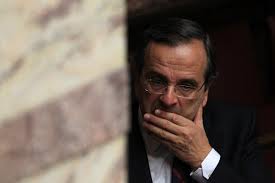The Econimist
PITY Karolos Papoulias. The 82-year-old president of Greece has spent over a week trying to persuade the country’s fractious political leaders to form a government after a general election on May 6th failed to produce a clear winner. Mr Papoulias, a soft-spoken former foreign minister, handed out mandates to various party leaders, none of whom could deliver, and made a three-day effort of his own, before finally giving up yesterday.
Success would have given Greece breathing space, if only for a few months, to pursue urgent reforms—such as recapitalising its insolvent banks and getting on with privatisation—to help restore its credibility with European partners and financial markets. Instead, another election now looms, on June 17th. Until then the country will be run by a caretaker government under Panagiotis Pikrammenos, Greece’s most senior judge. Lucas Papademos, the ex-European central banker who has run a coalition government for the last six months, overseeing a €206 billion sovereign-debt restructuring and Greece’s second bail-out, was not asked to stay on.
The transcripts of Mr Papoulias’s last three meetings, made public at the request of Alexis Tsipras, the leader of Syriza, a hard-left coalition, and Greece’s rising political star, reveal a disturbing lack of vision among the men who are supposed to be Greece’s leading politicians. Rather than tackle serious issues, such as how to keep Greece in the euro, they swapped insults and shrugged off a warning that a bank run was imminent. “They’re all irresponsible, none of them is capable of ending this crisis,” says Aristomenes Antonopoulos, a lawyer. “How to vote now?”
Support among Greeks for staying in the euro is up from 70% to 80% over the past three months, according to opinion polls. Yet fears that prolonged political instability could trigger a “Grexit” are also increasing. Greek savers withdrew €3 billion from local banks—about 2% of total deposits—as hopes of forming a coalition collapsed. Greece has seen a steady erosion of bank deposits over the past two years, yet few bankers were prepared for such a rapid acceleration of withdrawals. Deposits had increased in March and April, thanks to smooth handling of Greece’s partial default.
Today, cash was being taken away from the banks in orderly fashion. There were no queues outside branches in central Athens or its suburbs. Customers ordered cash by telephone and picked it up 24 hours later. Some went straight into safety-deposit boxes at the same bank; some was stashed beneath mattresses in case Greece has to re-adopt the drachma. “People are taking preventive measures,” says one veteran banker. “If you own a pile of euros, you’ll feel rich in a drachma environment.”
Despite their enthusiasm for holding on to the euro, Greeks are fed up with the austerity that German politicians say is the price of continued membership. Syriza suggests that such views are compatible, arguing that Greece can stay in the euro but also reverse the reforms imposed by the “troika” (the European Union, the European Central Bank and the International Monetary Fund).
This is a message Greek voters appear to like. A recent poll found that Syriza would win the next election with 20.5% of the vote, just ahead of the pro-euro New Democracy party on 19.4%, but well short of an overall majority. The PanHellenic Socialist Movement (Pasok), the only other electable party that supports reform, would come a distant third with 11.8%.
Mr Tsipras is reorganising his party and renewing his campaign, neighbourhood by neighbourhood, in Athens and other cities. His rhetoric is sharper than ever, yet his dream of forming a left-wing government is no closer to being realised than at the previous election. Potential partners have sounded more cross than co-operative since Mr Tsipras bounced into second place behind New Democracy on May 6th.
Antonis Samaras, the New Democracy leader, will pull out all the stops. If his centre-right party cannot form a government this time, his career will be over. A new alliance with a small liberal party should give him another couple of percentage points at the election. As for Evangelos Venizelos, the Pasok leader and a potential coalition partner, he is struggling to prevent more voters defecting for Syriza.
Even with the extra 50 seats that go to the party that comes first, the two pro-bailout parties will still struggle to form a government after the second election. The long-suffering Mr Papoulias is likely to be back in action on June 18th.



















